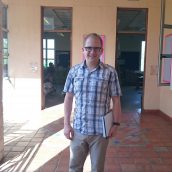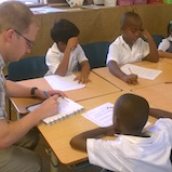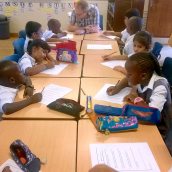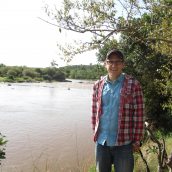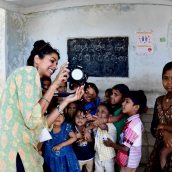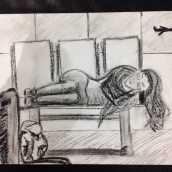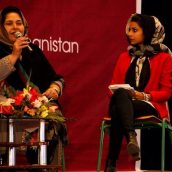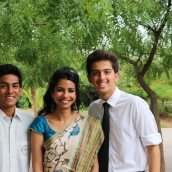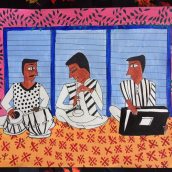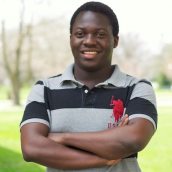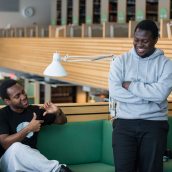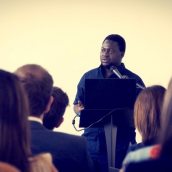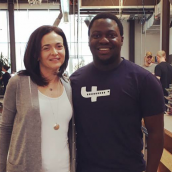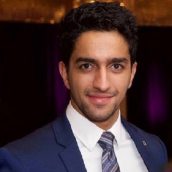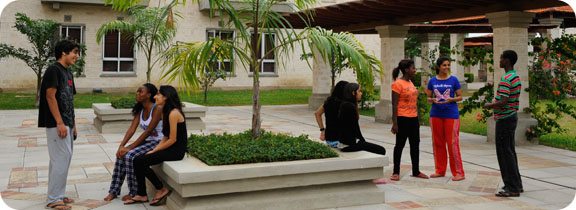
Living on Campus
Residential life at the Academy complements and extends the academic experience. The residential programme includes a broad selection of activities and leadership opportunities to enhance students’ learning and growth.
The Academy's residential programme officially opened in April 2009. Our student residences have been designed to accommodate students and dorm parents, who are teachers who have been chosen carefully and trained to live in the faculty apartments in the student residences.
Up to four students share a room. The rooms are spacious with high ceilings and large windows. Facilities include a student lounge with a breathtaking view out to sea and a large-screen television along with laundry facilities.
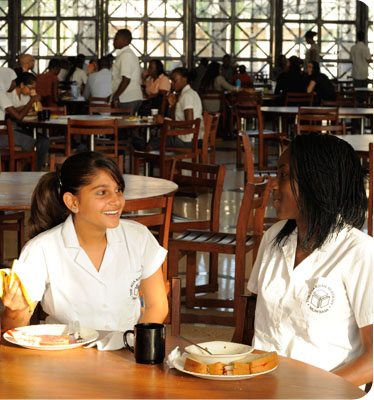 The Commons building houses the dining hall and an array of spaces for school activities. It is the hub of student activity and serves as the main space for major school functions, including music and drama performances and public lectures.
The Commons building houses the dining hall and an array of spaces for school activities. It is the hub of student activity and serves as the main space for major school functions, including music and drama performances and public lectures.
“The tour of the residential facility gave me a great sense of fulfillment,” said Bernard Dudi, a teacher and dorm parent. “I appreciate the amount of planning and resources and the thoroughness of the execution.”
Learning beyond the classroom
The culture of the Academy is based on respect, integrity, honesty, fairness, empathy and good humour. Our students, teachers and administrative staff create and sustain this positive learning environment.
The experience of our pluralistic learning community is especially rich for students in residence given the constant interactions among students, faculty and staff from diverse backgrounds.
The focus of the residential programme is on students’ intellectual, social, spiritual and physical growth in a structured and ethical environment. In the words of Aziz Batada, a former dorm parent, “The residential experience allows the typical school day – where the vision of the Aga Khan Academy is continuously being lived – to be extended, and education itself is seen as a part of every moment of an individual's life.”
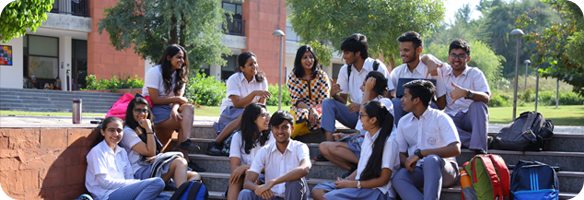
The Junior and Senior Schools
The Aga Khan Academy Hyderabad is made up of two schools, the Junior School and the Senior School, which together cater to students from grade 1 (age 6) to university entrance.
Junior School
All Junior School students follow the International Bacaalaureate (IB) Primary Years Programme (PYP). Through the PYP, our students learn to be confident, independent and creative learners.
The Junior School building has been designed to address the needs of younger children, with age-appropriate facilities and classrooms. In addition to the PYP classrooms, the building contains the Junior School library, and music, art and information technology rooms. There are also large playing fields and a playground.
Senior School
Students in the Senior School pursue either the IB Middle Years Programme or the IB Diploma Programme. Those from the local area can choose to attend as day students, while those from other parts of the country or region live on campus as part of the residential programme.
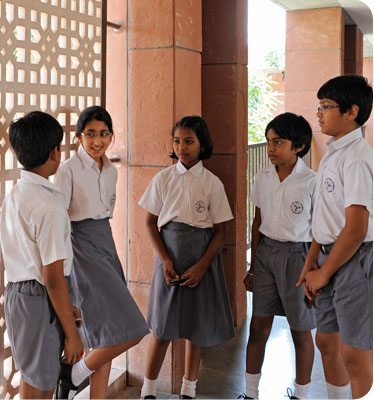 The Middle Years Programme is for students in grades 6–10. It helps them master essential skills and knowledge, and teaches them to be critical and analytical thinkers. The Diploma Programme is offered to students in the final two years of school. It is an internationally recognised and demanding programme that prepares students for university entrance.
The Middle Years Programme is for students in grades 6–10. It helps them master essential skills and knowledge, and teaches them to be critical and analytical thinkers. The Diploma Programme is offered to students in the final two years of school. It is an internationally recognised and demanding programme that prepares students for university entrance.
The school caters to both the intellectual and personal growth of students. It has a wide range of facilities that include:
- laboratories for the sciences and information technology
- art and music rooms
- library and resource centre
- career counselling centre
- student and teacher lounges
- cafeteria and dining area.
The building is networked so that computers become common resources for teachers and students. The multipurpose hall can be used for a variety of events ranging from theatre productions to parent–teacher meetings. The school also has swimming facilities as well as playing fields for soccer, field hockey and athletics.
For further information about applying to any of the programmes offered at the Aga Khan Academy Hyderabad, please refer to the admission requirements.
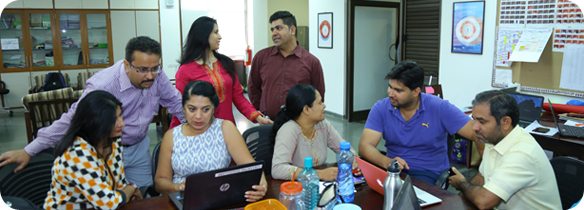
Meet the Faculty
Leadership Team |
|
| Head of Academy | Dr Jonathan Long |
| Deputy Head of the Academy, Pastoral Care | Jeffrey Anthony Doerfler |
| PA to Head of Academy | Vaishali Purohit |
| Principal, Senior School | Koel Ray |
| Principal, Junior School | Sreelatha Kumar |
| Dean of Academics | Neeraja Nibhanupudi |
| Dean of Students | Suresh Madhavan |
| Head of Finance | Mukul Vashishatha |
| Dean of Experiential Learning |
Vlad Gogelescu |
|
|
|
Admissions |
|
| Dean of Admissions | Arjun Puri |
| Manager, Admissions | Pramoditha Jamalpur |
| Admissions cum Events Officer | Zareen Hashmi |
Senior School Faculty |
|
| Principal, Senior School | Koel Ray |
| PA to Senior School Principal | Deepa Hitange |
| Assistant to Dean of Students-cum-Student Life Coordinator | Nilesh Talaulicar |
| Coordinators/Counsellors/SEN/Fellows | |
| Academic Development Coordinator | Joanne Gogelescu |
| Diploma Programme Coordinator | Sudipta Roy |
| Associate Diploma Programme Coordinator | Dr Sujana Veeramachaneni |
| Theory of Knowledge Coordinator | Sudeep Ghosh |
| Creativity, Activity, Service Coordinator | Venkat Reddy |
| Middle Years Programme (MYP) Coordinator | Meenakshi Joshi |
| Head of Middle Years | Rajesh Kayiprath |
| MYP Personal Project Coordinator | Chandrabhan Yadav |
| TPP - Coordinator, Internship & Leadership | Pratibha Thimmaraya |
| University Counsellor | Pragati Pandey |
| Inclusive Education Coordinator (SEN) | Namrata Bhushan |
| Extended Essay Coordinator | Vlad Gogelescu |
| Creativity, Activity, Service Coordinator (CAS) | Venkat Reddy |
| Science | |
| Biology & Environmental Systems and Societies | Vinay Singh |
| Environmental Systems & Societies / Integrated Sciences | Pratibha Thimmaraya |
| Chemistry | Dr. SureshKumar Manthiriyappan |
| Chemistry | Megha Saban |
| Physics | Sudipta Kumar Roy |
| Physics | Suhel Vakkal |
| Physics | Sathish Gadarla |
| Senior Lab Technician | Giribabu Kuna |
| Lab Technician | Sudhakar Konapala |
| Lab Technician | Smriti Mandal |
| English | |
| HOD, English | Gopika Jadeja |
| English / ToK | Sudeep Ghosh |
| English / ToK | Chandreyee Das Gupta |
| English / MUN Coordinator | Saloni Chesney |
| Mathematics | |
| HOD, Mathematics | Tarun Seth |
| Dean of Studies, Mathematics & ToK | Neeraja Nibhanupudi |
| Mathematics Teacher Coach | Vani Vishwanath |
| Mathematics | Subhashini Chandra |
| Mathematics and MYP Personal Project Coordinator | Chandrabhan Yadav |
| Mathematics | Santhosh Reddy |
| Mathematics | Krishnendu Saha |
| Mathematics | Usha Shivakumar |
| Expressive Arts | |
| HOD, Arts | Nandakumar P. K. |
| Visual Arts | Meenakshi Joshi |
| Visual Arts | Visweswara Rao Brahmanapalli |
| Music | Chin-Yen Huang |
| Theatre - Arts | Dr Chandrasekhar Indla |
| Theatre - Arts | Subesh Poddar |
| Languages | |
| HOD, Hindi / Senior Tutor | Dr Karuna Arya |
| Hindi / CAS Coordinator | Venkat Reddy |
| Hindi | Dr Sunita Ghosh |
| Hindi | Radhika Tiwari |
| Hindi | Neetu Reddy |
| Hindi | Dr Chandrakant Shinde |
| Hindi | Sushmita Banerjee |
| Telugu | Sai Krishna Ranga |
| HOD, Foreign Languages | Manisha Deshbandhu |
| French | Mopuru Raghu Rami Reddy |
| Dari / Persian | Ahmed Ferozi |
| Humanities (I&S) | |
| HOD, Economics / ToK | Gaura Joshi |
| Economics & MYP Coordinator | Rajesh Kayiprath |
| Economics and Business Studies | Rahul Menon R |
| MYP – I and S / History | Ritu Seth |
| Global Politics / Extended Essay Coordinator | Vlad Gogelescu |
| Geography | Joanne Gogelescu |
| History/ToK | Koel Ray |
| Individual & Societies | Aarushi Dutt |
| Individuals & Societies / History | Sarmishtha Adhya |
| Humanities | Afeera Maryam |
| Economics/Humanities |
Suresh Madhavan |
| ITGS & Design | |
| Acting HOD | Koel Ray |
| Design & Computer Science | Mehabunnisa |
| ICT / ITGS | Surya Prakash Vemparala |
| Design & Data Management | Veni Veeramachaneni |
| Physical Education | |
| HOD, Physical Education | Srungarapati Ravi Kumar |
| Physical Education | Ramesh Kumar Kaliraman |
| Swimming Assistant | Seena Remadevi |
|
Library |
|
| Head Librarian | Madhu Bhargava |
| Librarian, Senior School | Shakeel Ahmed Khan |
| Librarian, Junior School | Veena Bhat |
Learning Enrichment Team |
|
| HOD Learning Enrichment / English as an Additional Language (EAL) / Special Educational Needs (SEN), Gifted & Talented (G&T) | Susan Long |
|
SEN |
Namrata Bhushan |
|
EAL/SEN |
Morag Kallepu |
|
EAL |
Rema Vishwanath |
|
EAL |
Elizabeth Holden Eckel |
|
EAL |
Aarushi Dutt |
|
Learning Enrichment |
Faridah Lakhani |
|
Academic Support |
Amanda Khongwir |
Junior School Faculty |
|
| Principal, Junior School | Sreelatha Kumar |
| PA to Junior School Principal | Shabana Awadiya |
| Primary Years Programme (PYP) Coordinator | Abhimanyu Das Gupta |
| Teachers | |
| Day Care | Shwetha Emandi |
| Grade 1A Home Room | Rhitesha Paul |
| Grade 1A Co-Teacher | Neetu Chennuri |
| Grade 1K Home Room | Madhulita Patnaik |
| Grade 1K Co-Teacher | Simran Sinha |
| Grade 2A Home Room | Mitu Sharma |
| Grade 2A Co-Teacher | Laila Narsingani |
| Grade 2K Home Room | Chetna Sharma |
| Grade 2K Co-Teacher | Swati Kansal |
| Grade 3A Home Room | Anjum Budhwani |
| Grade 3K Home Room | Disha Kerkar |
| Grade 4A Home Room | Lavanya Pavan Vadavalli |
| Grade 4K Home Room | Vidhya Pallath |
| Grade 5A Home Room | Sanjana Amarnani |
| Grade 5K Home Room | Sheila D'Souza |
| Hindi | Sushmita Banerjee |
| Hindi | Meena Uniyal |
| Telugu | Kasthuri Varanasi |
| Telugu | Deepika Aluvala |
| Visual Art | Florence James |
| Music | December Lynn |
| Physical Education | Vajravani Polavarapu |
Sharing practice across oceans
Andrew Jones is a teacher from Ontario, Canada who has spent the past year at the Aga Khan Academy Mombasa, working with the Junior School as part of a teacher secondment partnership between the Aga Khan Academies and the Province of Ontario.
On first arriving at the Academy Andrew said, “I [am] expecting an enriching experience that will allow me to learn about another culture by being immersed in it. I expect to grow as an educator because different settings, both culturally and through the [International Baccalaureate] programme, will allow me to expand my skill set as to how best practices support student learning.” One year later, he reflects on his experience.
Almost two years ago now, I was reading the book, Everyone Can Learn to Ride a Bicycle, by Chris Raschka to my new grade one class in Kitchener, Ontario, Canada. This book helps me encourage my students at the start of the year to continue developing resiliency through adopting a growth mindset by trying new things, taking risks and reflecting on both successes and mistakes. Little did I know, I was not just teaching my students this skill, but I was also going to follow this advice myself.
Ever since I began teaching almost 10 years ago, many changes in my job assignment have sparked a passion for professional learning and development in my teaching practice. Over this year, I have immensely enjoyed this new job working for the Ministry of Education in Ontario on an educational partnership between our government and the Aga Khan Academy Mombasa. I have had the opportunity to grow and learn as both an educator and an individual through my interactions at the Academy and through daily life in Mombasa.
Working at the Aga Khan Academy Mombasa has been an immense opportunity of both professional and personal learning that I am thankful for. I ask myself this very question, “What best teaching practices am I learning about that I should share with Ontario teachers?”
Here are three that I have learned more about since being here.
Building Confident Leaders – Students build their confidence and exude enthusiasm as they try new things and take risks during their participation in a variety of classroom activities, sports galas, enrichment opportunities and Friday assemblies. Students are confident, have strong leadership skills and advocate for equity. Confidence stands out as a defining characteristic of the learners present here in the Junior School.
Promoting Pluralistic Thinking – The Junior School’s demographic is vibrant and diverse, reflective of the Mombasa community’s cultures, religions and backgrounds. Activities at the school, such as the Arts Week performance, continually emphasise appreciation and understanding toward different views and beliefs and encourage students to think pluralistically as they work together.
Dual Language Practices – I have been learning Kiswahili “pole pole” this past year, and I am quite experienced in giving directions to tuk tuks and boda bodas. As I learn a new language, it helps me think about the world in different ways and makes me more pluralistic in my thinking. Likewise, students at the Academy develop academic competency and fluency in both the national language of Kenya, Kiswahili, and the official language of Kenya, English. Additionally, learning similar concepts in two languages allows students to develop pluralistic view points as languages sometimes look at similar ideas in different ways.
I am thankful to explore Kenya’s beauty and diversity, so far from Mount Kenya to the Masai Mara to Mombasa. I continue to grow and to learn and am thankful to the kind and generous Mombasa community that has made my transition to working at the Academy warm and welcoming. I feel very privileged to be working with such a dedicated and caring staff and with phenomenal students.
By Andrew Jones
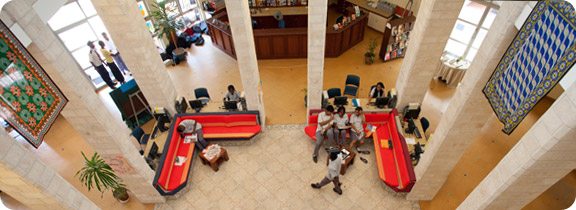
Articles of Interest
The articles listed below have been drawn from the Aga Khan Academies newsletter. They include feature stories and information on aspects of the Aga Khan Academies programme.
Subscribe to the Aga Khan Academies newsletter
Kamini Menon – communications for change
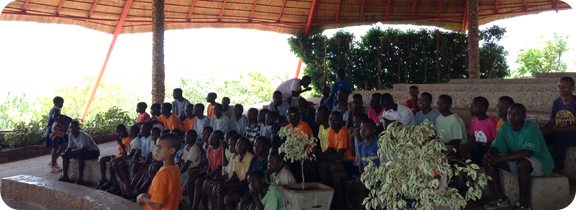
English Language Programme
Prior to opening the Lower Junior School in August 2013, the Aga Khan Academy, Maputo will be offering a series of English language programmes. The programmes will start in February 2013 and run until the end of March 2013.
Prior to opening the Lower Junior School in August 2013, the Aga Khan Academy in Maputo will be offering a series of English language programmes. They will start in February 2013 and run until the end of March 2013.
The programmes are for children, aged between 4 and 8 years old, who wish to improve their English language ability prior to applying for admission to the Academy in August 2013. Throughout there will be a strong emphasis on communicative language development, but the programme will also include the development of reading and writing skills.
Dates for the programmes:
- Programme 1 – 25 February to 1 March
- Programme 2 – 18 Mar to 22 March
- Programme 3 – 25 Mar to 29 March
The day will begin at 0900 and finish at 1500. We regret that spaces are limited to 20 children per week, so please register early. Note that children can only be registered for one programme during this time and admission will be subject to an interview with the Academic Director.
The programmes will be located in an existing building in Moztex, Matola, while the main Academy is being built on a site nearby.
- For further information, please contact Lee Davis, Director of Academic Planning and Development (lee.davis@akdn.org).
Ham Serunjogi: Blazing a path across three continents
Look below for a video of Ham talking about his experience at the Academy.
Swimming from Uganda
Ham Serunjogi, age 23, grew up in Uganda and started swimming competitively at age 6. His parents encouraged his academics and his athletics, and Ham excelled in both. In 2010 he enrolled at the Aga Khan Academy in Mombasa, Kenya.
On his way to Kenya, he competed in the Youth Olympics in Singapore in 2010. At AKA Mombasa, he trained and studied hard, learning leadership and teamwork. He became president of the AKA Student Representative Council. At the Academy he became fascinated by digital communication. In 2011 he conducted a school project back home in Uganda, where he interviewed the IT manager at Cineplex Uganda.
To America
Ham’s drive got the attention of educators. After graduating from the Aga Khan Academy he received a scholarship to study in the United States. He pursued a bachelor’s degree at Grinnell College, where he majored in Economics.
With a fellow Grinnell student, Ham developed an app that allowed users to send short, encrypted voice recordings that would self-destruct after they were played. It was a smart solution that anticipated the rise of privacy concerns in technology. The app could work in places where voicemail systems weren’t common, like Ghana, where his app partner grew up.
The habits cultivated at AKA continued to bear fruit, he says. “The education I gained at the Academy had an emphasis on critical thinking,” Ham explains. That critical ability for problem solving fueled his achievement at Grinnell, along with a conviction that he had something to contribute.
Taking New Ideas to Facebook in Europe
As he prepared to graduate from Grinnell, Ham let himself dream big. He set his sights on the biggest social media giant he could find. “I took an unorthodox approach,” Ham said of his strategy for getting a job. “Instead of applying online, I sent an email directly to Sheryl Sandberg.”
He received responses to his email within hours, urging him to apply online. Soon recruiters were calling to set up interviews. The interviews led to an internship on Facebook’s Global Accounts Team in New York during the summer of 2015, before his final year of study at Grinnell College. There he enjoyed a surprising degree of autonomy to tackle issues that he cared about. In his first weekly one-on-one with his supervisor, she asked him, “What are you most passionate about?” He took that as encouragement and created a new initiative.
Ham is amazed by where life has taken him.
Keeping up Connections and Giving Back
Again and again, Ham has drawn on his experiences from AKA Mombasa, and the bonds among his Academy friends remain strong. Before starting his new job in Ireland, he visited friends and family in Uganda. He still connects often with his AKA Mombasa roommate, Aleem Mawji, now a student at the University of British Columbia. Ham’s friend from the AKA swim team, fellow Ugandan Joshua Tibatemwa, followed his path as a AKA swim team star and student president. Joshua also followed Ham’s example to Grinnell, where he’s now a student. Joshua competed for Uganda at the Rio Olympics last summer.
Ham took time away from settling into Dublin life to watch the Olympics on television, hoping to catch a glimpse of his friend.
Ham has launched into a life of active engagement, creating networks that make people’s lives better. He has seen how such networks make a difference. He shows dedication to paying it forward.
This spotlight is republished courtesy of AKF USA.
Aleem Mawji (Class of 2012): The most powerful weapon
A Hand Up at the Aga Khan Academy
I was born in Dar es Salaam, Tanzania, where I went through Aga Khan Nursery, Primary and Secondary schools. When I was approaching my last two years of secondary education, I started considering a move away from home to prepare for life in university, and the Aga Khan Academy Mombasa came to mind. I had visited the campus in seventh grade for a soccer tournament, and was left amazed by the beauty of the facility.
To be perfectly frank, my family’s financial circumstances would have made it very difficult to attend the Academy; some form of financial assistance was crucial. I was thrilled when AKA saw past the financial difficulty, recognized my accomplishments and potential to excel, and accepted me with a scholarship. I gratefully accepted the scholarship, knowing I had a responsibility to make full use of this immense opportunity. So at age 16 I set out for Mombasa and started with the International Baccalaureate (IB) program!
Learning a New Mode of Thinking; Meeting a New Community
Every day at AKA was challenging, as anyone that has experience with the IB program can certainly attest! Even mathematics presented a new language; I remember having to read a paper on mathematics with the date of publication and page numbers being the only numbers in the entire document! However, my most valuable academic experience was studying the Theory of Knowledge. This course focused very strongly on making one critically examine what it is that we “know.” To this day it has me questioning a lot of premises I would otherwise accept.
While the academic environment was fairly rigorous, it only enforced the already-strong sense of community one would experience in the residential program. One moment, we were scratching our heads over a physics lab report due that evening, and the next, we were plotting ways to sneak into the AstroTurf to kick the soccer ball around! In my opinion, this type of learning environment truly makes the Academy a unique and fulfilling experience. To this day, I still regard many of my dorm-mates as extended family rather than school colleagues.
Path to British Columbia
At the end of my two-year stay in Mombasa, I was honored to receive the Academy’s Medal of Honor for highest academic standing, and Award of Excellence; an all-round award for academics, sports, extracurricular, leadership, and volunteering. I was also nominated by the Academy for the International Leader of Tomorrow Award from the University of British Columbia (UBC). I received this award in the form of a full scholarship to study the program of my choice at UBC’s campus in Vancouver, Canada. While I left the compound of the Academy with immense joy knowing I had fulfilled some expectations placed on me, I felt an even greater sense of responsibility to myself, my family and the Academy given my opportunity to study in British Columbia.
The program I decided to study was Mechanical Engineering. Coming from a family of engineers certainly played a role in this decision, but I most appreciated the versatility of the degree and how the applications of mechanical engineering design spanned a range of industries. Over the course of my degree, I have worked on projects ranging from micro-controller-based autonomous vehicles, to a drip-irrigation system for optimizing use of a limited water supply. I have also spent eight months in the maintenance engineering department of a large copper mine, and have worked on the design of a device to prevent excessive bleeding from an injured limb.
I attribute my desire to work on this wide range of projects to two things: an unwillingness to be satisfied with the knowledge the I possess at any time, and a desire to have a larger positive impact on as many fronts as I can, when I have the capacity to do so. While these are arguably generic traits, my belief in them has been strongly enforced by the people I met at the Academy, and the Aga Khan Academy Learner’s Profile that the institution so strongly stands for and promotes in its students.
Working Together
During my third-year in university, I found myself at a cross-roads. While I enjoyed the versatility of the engineering degree, a part of me knew that becoming a professional engineer may not have been best-suited to my aspirations.
When I was in London visiting my cousin in the summer of 2015, he introduced me to the world of management consulting. Initially, it brought to mind an image of a team in suits, working in isolation, preparing a PowerPoint deck instructing a company on changes to be made to achieve X. I later discovered how out-of-date this impression is. Management consulting, I have found, is all about solving complicated problems that have a large impact on the clients and the community around them. More often than not, this is achieved while working hand-in-hand with the client companies to implement a proposed solution.
I learned more about this industry during a recent internship with McKinsey & Company. During this time, I got to work with a large coal mine that was seeking to reduce its maintenance costs. What was truly unique about this experience was how we were in the field, working with the tradesmen, foremen and managers, asking ourselves questions like “How do we know when best to replace this $300,000 piece of equipment? What actionable change can we make to our maintenance practice? How can we track the effect of this change?” We would draw on the strengths of each other’s backgrounds and figure out practical solutions together! I really appreciate this idea. I don’t want my work to be just theoretical or conceptual. I want to be on the front line, working with the people in question to make these changes tangible.
Harnessing Potential
One project that grew during my undergraduate study was a company that my brother, Naeem, and I co-founded. The company’s goal (to increase the access to electricity for people in Tanzania) was strongly based on values my family instilled, and that were prevalent at my time at the Academy. First, it applied the idea of giving back when one has the capacity to do so – not because we have to, but because we can. Second, it focused on the notion of sustainability and building capacity; not a one-time handout, but an activity that helps people harness their own potential to thrive.
In some ways, I see parallels in the role that the Aga Khan Academy has played in my story. As I approach the end of my undergraduate studies and begin my transition into a professional career, I reflect on the events that have taken place, and the individuals that have played a role to get me to the position I am in. While I owe an unparalleled amount of credit to my parents and two siblings for instilling the right foundation, I cannot overestimate the role the Academy played in my development. I came into the Academy with a scholarship, viewed as a student with potential, and have since become an individual with a stronger belief in my ability to harness my own potential, and that of people around me. That, I believe, is the most powerful weapon.
This spotlight is republished courtesy of AKF USA.
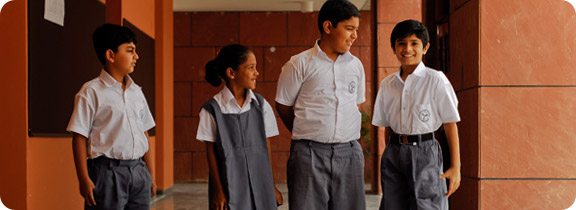
International Exchanges
As the network of Aga Khan Academies becomes established, we will offer our students the opportunity to broaden their experience through exchanges with other Academies.
The Aga Khan Academy Maputo will include an international exchange programme as part of the Senior School curriculum. This will provide our students with the opportunity to study for an extended period in another of the approximately 18 (planned or currently under development) Academies in Africa, South and Central Asia, and the Middle East.
Campus life
Students from Maputo who go on exchange to another Academy will live in residential facilities in a safe, secure campus setting.
Campus life is an important part of the international exchange programme. Many of the least tangible but most important elements of an education – the development of practical leadership skills, the capacity to make ethical judgments, the ability to navigate through complex cultural settings – are formed outside the classroom. Mealtimes and other informal gatherings offer opportunities for discussion, meetings, language tables and study groups.
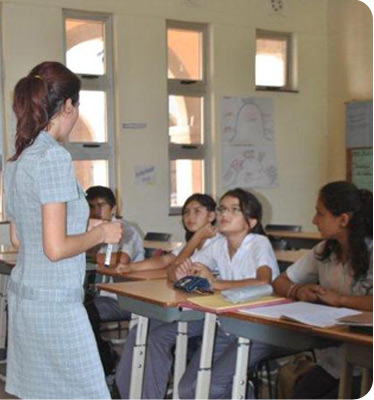
A number of students from Tajikistan are presently studying at the Aga Khan Academy in Mombasa.
Benefits of study abroad
The International Baccalaureate programme will be implemented at all Aga Khan Academies. The common curriculum will allow students to study abroad without facing uncertainties regarding compatibility of course study or examinations.
While English is the medium of instruction at all Academies, our students are required to study another language as well. Foreign language learning will be greatly enhanced by immersion in that language through the exchange programme.
Students will also learn to appreciate and respect other nationalities, cultures and intellectual traditions through direct contact with people in other countries. They will broaden their worldview and learn to be at ease in multicultural settings.
For further information on the educational programme offered at the Aga Khan Academy Maputo, please visit the Academic Programme page.
